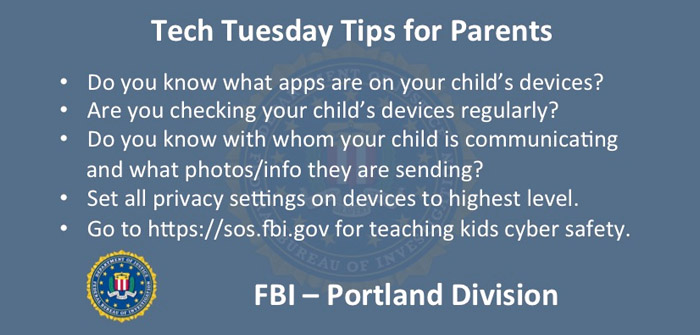A 2017 study by the Centers for Disease Control showed that about 15 percent of high school students say they are bullied online. The bully may pretend to be someone else — such as a new boyfriend or gaming partner — to get the victim to share personal information. The bully may share — or threaten to share — messages that include rumors, lies, sensitive information or photos that are hurtful and embarrassing. Bullies may even threaten or encourage someone to kill themselves.
It is important that parents and kids are working together to keep students safe. The best thing you can do as a parent is to build a relationship with your child where you can both feel comfortable talking about and sharing your child’s online experience.
Let’s start with the parent portion of all this:
- Do you know or control what apps are on the phones in your home?
- Are you checking your child’s devices and accounts regularly? Parents should have the passwords to every device and every app or social media platform the student is using.
- Do you know who your student is talking to by text or email and on social media? What information and photos or videos they are sharing?
- Have you made clear your expectations about appropriate behavior and privacy?
Now some points for students to consider:
- Being kind to others online will help to keep you safe. Do not share anything that could hurt or embarrass anyone. You never know what someone will forward.
- Keep your passwords and PINs a secret from other kids. Even friends could give your password away or use it in ways you don’t want.
- Set your privacy settings to the highest levels on your devices and social media accounts. Only share your thoughts and photos with friends – not friends of friends or complete strangers.
- Keep your parents in the loop. Tell them what you’re doing online and who you’re doing it with. Let them friend or follow you. Listen to what they have to say about what is and isn’t okay to do.
We are lucky that in our state we have a really effective program to help kids dealing with cyber bullying and other threats. It’s called Safe Oregon, and it is a program that brings law enforcement and school officials together to help kids. You can report cyber bullying to Safe Oregon online at safeoregon.com. There’s also information on that website about other ways you can report concerns by calling, texting or emailing. Choose the option that works best for you.
Parents — if you have younger kids at home, start the discussions early about appropriate online behavior and the damage that they can do to themselves and others if they make poor choices. The FBI has a cyber citizenship program called Safe Online Surfing — or SOS — to teach kids in third through eighth grade about safe and responsible internet use. The interactive, game-based program emphasizes the importance of cyber safety topics such as password security, smart surfing habits, and the safeguarding of personal information. This free program can be used by families at home or by teachers in schools. For more information about the SOS program, go to sos.fbi.gov.





